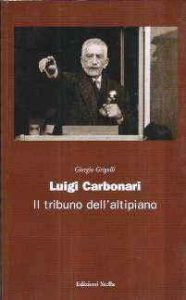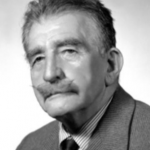He was born on 3rd October 1880 in the hamlet of Carbonare on the upland of Folgaria, but he lived permanently in Strigno. He went to Vienna, Pavia, Padua for his university studies and eventually to Heidelberg, where he graduated in political science in 1908. In 1902, when he was only 22, as a universitarian student, he established the Credit Institution and the Cooperative Society in Carbonare and he stood out for being a tireless promoter of multiple agricultural cooperatives and a promoter of work on the land of Trentino, he was a leading representative of the local and national autonomy. In 1912 he had already contributed to founding 40 agricultural cooperatives and between 1919 and 1921 he set up 117 workers’ cooperatives.
With the arrival of the confessional movement, Carbonari left the Federation in order to create the Federation of the farmers’ Leagues.
In 1906 he was incarcerated together with Alcide De Gasperi for taking part in the demonstration for the Italian University of Trieste.
In 1907 he was a student in Vienna where he graduated in Law, he was the third accused among the 42 students who were arrested for demonstrating for the annexation of Trentino to Italy.
In 1911 he was elected for the “Popular” at the Assembly of Innsbruck.
In 1912 he was alongside Alcide De Gasperi in the historical Catholic Congress in Trento during which the Popular Party was established. The esteem of the statesman from Trentino towards Carbonari is the highest and it is confirmed by a sentence of Alcide: ”People from Trentino, when you see a man like this, take your hats off”.
During WWI he served as an officer of the Austrian army, but he soon deserted, taking refuge in Florence, where he waited for the end of the war.
Until 1926 he was president of the Federation of the Farmers’ Leagues, created on his own instinct.
On a political level he encouraged the annexation of Trentino to Italy at the beginning of the century; he was a friend of De Gasperi and politically alike, he was elected deputy until 1926.
He was persecuted by the regime, he didn’t compromise during fascism, choosing a solitary and humble life and then joining the Resistance, becoming later active again in the cooperative and political sectors during the second post-war.
In 1946 he was elected to the Constituent Assembly. He was nominated Commissioner of the Labour Office and president of the Federation of cooperative Consortia from 1945 until 1958. In 1946 he started a periodical called “Il Contadino”.
Furthermore he was elected deputy, with autonomist opinions next to De Gasperi and Mott, and he sat in Parliament until 1953.
In 1964 he was elected to the regional Council of Trentino Alto Adige, supported by one list: “Alliance of farmers and artisans” . It was a time of rebirth for cooperation in Trentino after difficult years of fascism, as it happened in the whole country where many cooperative members strived for a return to the economic, social and community values of the cooperative movement, there was legislative support and the refounding of national authorities.
As for Trentino, that was the time of implementation of autonomy, with contributions and benefits to the world of cooperation and the creation of second-level cooperatives in all sectors.

Further reading:
Giorgio Grigolli, Luigi Carbonari. Il tribuno dell'altipiano, Stella, Rovereto, 2002

